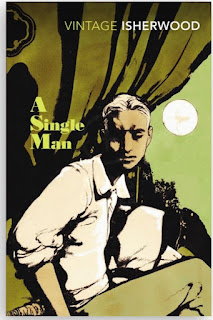A Single Man
I picked up a second-hand copy of A Single Man in a bookshop in the Blue Mountains. I had wanted to read Christopher Isherwood since quoting from Goodbye to Berlin in my own novel, The Copyart Murders. What I found in this novel surprised me on a number of different levels. First, there was the frankness of the depiction of a gay man who has just lost his partner, Jim – we find out how later in the novel. This is 1964, and I thought about how the issue of gay marriage, topical as it is, is not new in the sense of couples like George and Jim having lived together in all-but-wedlock for years now. The description of the suburban life they have been living, with George’s silence to his neighbours about the true reason for his ‘room-mate’s’ absence is poignant, yet saved from sentimentality by the irony of George’s natural outlook on life. This leads to the second surprise in the novel – the moments of real human insight, hopeful and profound in nature. In this respect, I should have expected as much (hadn’t I quoted Isherwood before, without even having read him?).
The novel follow’s George’s viewpoint closely, almost a
first-person narrative in effect, and the tone is one of the British ironic
view of America, a place of change and constant development. Like Dicken’s ‘Coke
Town’, the university is ‘the storm centre of … grading, shovelling, hauling
and hammering ... a clean modern factory’, a ‘factory’ that when ‘fully
operational’ will be able to ‘process twenty thousand graduates’ (p.28). Then
comes the surprise. Despite George’s ironical view of the campus and its
surroundings, he realises that ‘absurdly, inadequately, in spite of himself
almost, he is a representative of hope’ (p.33). The novel explores the
teacher-student relationship, and while it isn’t typical of the genre
(Americans love films about teachers and their profound wisdom) there is a
pedagogical dimension to this, undercut by George’s self-doubt and refusal, I
imagine, to take on a role that limits his own ability to grow, or become ‘sillier’
with age. George’s student, Kenny, asks him about the point of experience if it
doesn’t make you wiser? George refutes this simple notion: ‘I only mean, you
can’t use it. But if you don’t try to – if you just realise it’s there and you’ve
got it – then it can be kind of marvellous – ‘ (p.130).
Another interesting facet of the novel is the ‘After the Bomb’
context. I use this phrase for any students of English Extension 1 (HSC) – I took
a few pages from the text to show my own students how the Cold War context is
subtly included in the setting and characters (the effect of the presence of
the nuclear arm’s race and the tensions of this period). A few examples are
George’s arrival at the university (pp.28-29); reference to the House of
Un-American Activities Committee (p.71); the change of war which means all will
be killed, not just the youth (p.127).
To see how these elements work together to the novel’s
conclusion (George as alternative-teacher; moments of profound discourse; the
nearness of war and death) would be to say too much in a short review of a
short novel. Suffice to say that A Single
Man packs a strong punch for a character-based, intellectual novel that
resonates in its time and yet speaks clearly today. I’m glad that I read it; I’ll
get on to Goodbye to Berlin just as
soon as my hands touch a copy (or I clear the backlog of books I have yet to
read or have shamefully half-read in the pursuit of narrative happiness …).




Comments
Post a Comment